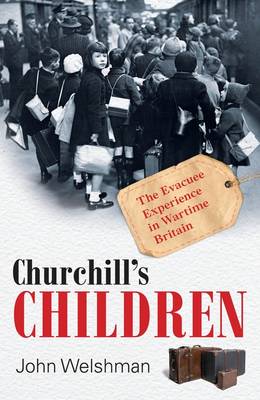By Kirsty McHugh, OUP UK
Oxford University Press author John Welshman went to his first literary festival last week, and has kindly written a post about the experience for OUPblog. Below he talks about some of the most interesting questions the audience asked him, and reflects on the differences between academic historian and popular historians, inspired by some of the fellow writers he met there.
John Welshman is Senior Lecturer in the Department of History at Lancaster University. His book, Churchill’s Children: The Evacuee Experience in Wartime Britain, tells the moving real-life stories of British schoolchildren evacuated out of major cities during the Second World War.
Last Wednesday afternoon found me at the Words by the Water Literary Festival in Keswick. It was a fascinating experience, not least because it was not only the first time that I had been to a literary festival as a speaker, but it was also the first time that I had been to one in any capacity. My Chairman had been an evacuee, and at the start we established that there were at least half a dozen evacuees in the audience. There was a lively question-and-answer session afterwards:
 Did parents have to send their children away? No, evacuation was voluntary, and indeed registrations remained surprisingly low in the Autumn of 1939. In fact fewer evacuees turned up at the railway stations than had been expected, and it was partly because of this that the operation was telescoped, leading to confusion in the Reception Areas, where the numbers of the parties arriving, and their composition, was different to what had been expected. This also meant that the proportion of the child population sent away varied between the main cities. In terms of the families who took evacuees in, on the other hand, this was compulsory, unless householders could justify their refusal in some way. Again, there were striking variations between the Counties, in the late 1930s, in the amount of accommodation that had been ‘privately reserved’.
Did parents have to send their children away? No, evacuation was voluntary, and indeed registrations remained surprisingly low in the Autumn of 1939. In fact fewer evacuees turned up at the railway stations than had been expected, and it was partly because of this that the operation was telescoped, leading to confusion in the Reception Areas, where the numbers of the parties arriving, and their composition, was different to what had been expected. This also meant that the proportion of the child population sent away varied between the main cities. In terms of the families who took evacuees in, on the other hand, this was compulsory, unless householders could justify their refusal in some way. Again, there were striking variations between the Counties, in the late 1930s, in the amount of accommodation that had been ‘privately reserved’.
How important was social class? A difficult question to answer in that working-class children went to middle-class homes, and middle-class children went to working-class homes. Revisionist historians have argued that rather than evacuation bringing the social classes closer together, it drove them further apart. My own view is that evacuation did reveal the poverty of people in the cities to people living in the countryside, and that this did feed into debates about postwar reconstruction. The bulk of the people evacuated in the ‘official’ Government scheme, in contrast to those evacuated ‘privately’, were working-class children and their mothers.
What part does Churchill play in the book? Neville Chamberlain was Prime Minister in September 1939, at the time of the first wave of the evacuation, and Churchill only became Prime Minister in May 1940. Churchill did feature in House of Commons debates from the mid-1930s which reveal the anxiety about aerial bombing that itself was a key influence on planning for evacuation. But the metaphor of ’Churchill’s Children’ is more a device to convey the book’s attempt to focus on the wartime period as a whole, the way I follow the ch


